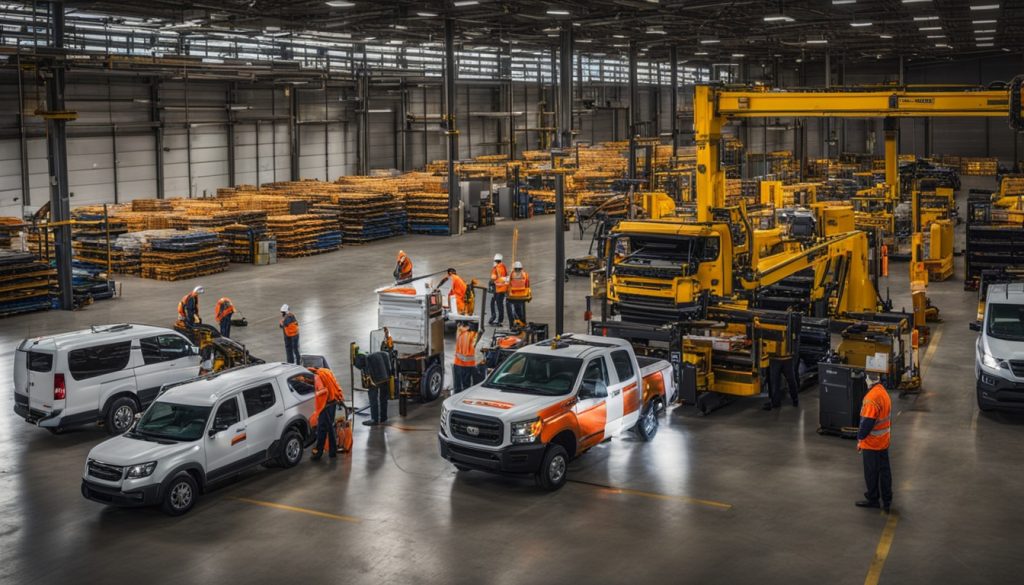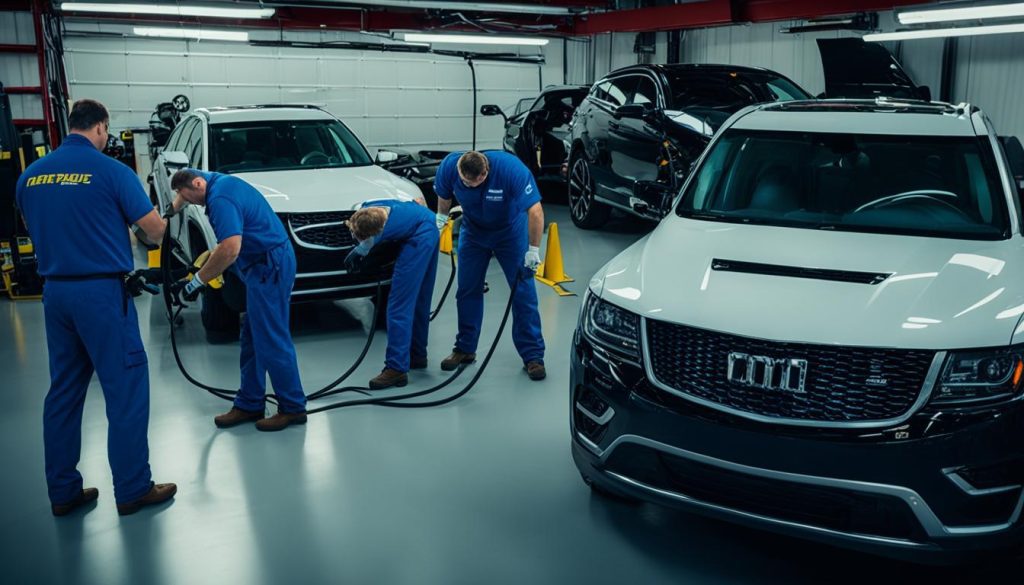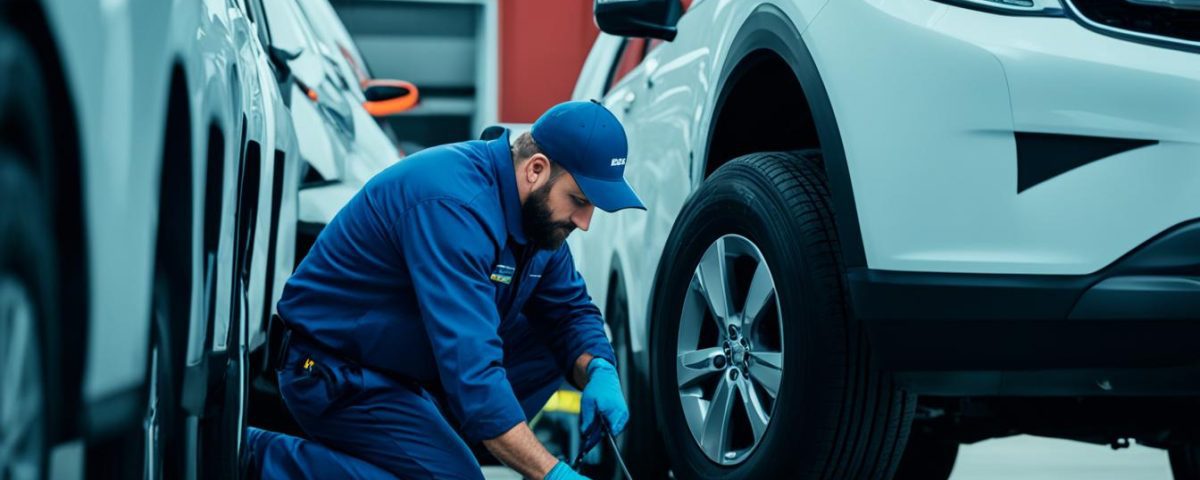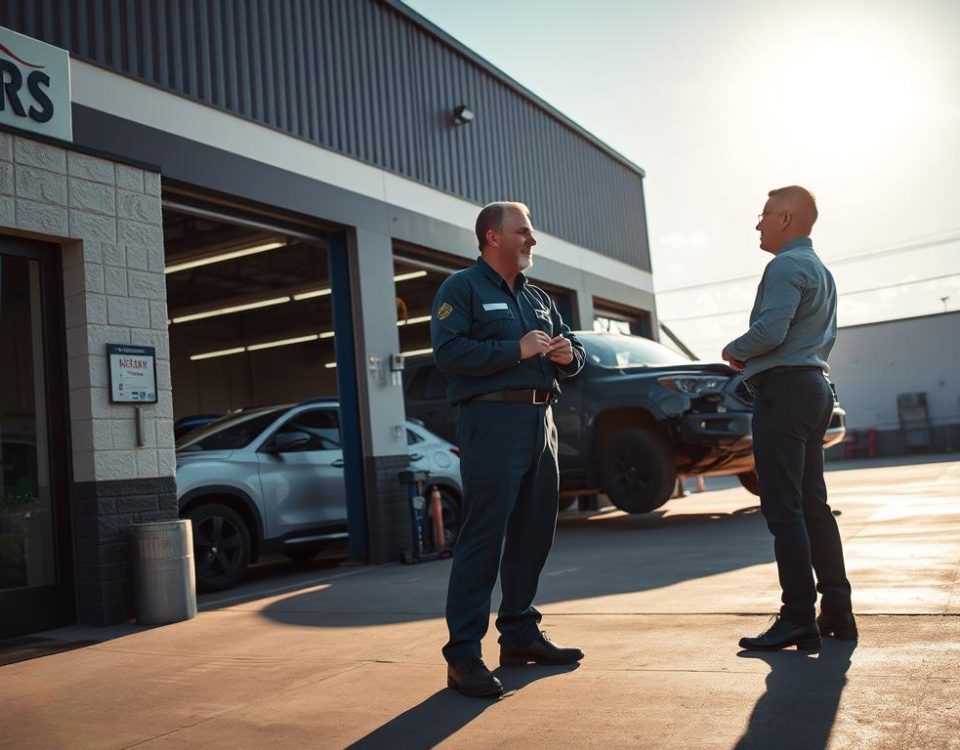
How to Deal with Fender Benders: Immediate Steps to Take

How to Choose the Right Paint Color After a Repair
It’s critical for fleet owners to regularly inspect their vehicles for safety and efficiency. At [Business Name], we value a well-maintained fleet. These checks are vital for safety regulations. They help avoid accidents, find mechanical problems, and foster a safety-first culture.
Thorough inspections catch problems early, which keeps us from facing legal fines and cuts down on expenses. Our priority is the safety of our drivers, the public, and the excellence of our vehicles. Regular checks spot potential dangers, ensuring our fleet runs safely and reliably.
Our dedication to regular inspections shows our care and duty toward safety. It proves we are focused on a secure environment for everyone. Also, it helps our fleet last longer, keeping our cars in top shape and cutting down on surprises.
Managing a fleet is a challenging job that requires a keen eye for safety. Regular inspections are key. They protect our drivers, save money, and maintain our good name. Through these checks, we keep our fleet safe, reliable, and competitive in our field.
Key Takeaways:
- Regular vehicle inspections are crucial for fleet owners to maintain safety and efficiency.
- Inspections help prevent accidents, identify potential mechanical issues, and promote a culture of safety.
- Thorough inspections detect problems early and reduce costs.
- Regular inspections contribute to a culture of care and responsibility within the organization.
- Inspections ensure the longevity of the fleet, minimizing breakdowns and disruptions.
The Benefits of Establishing Inspection Duration
Setting a fixed time for vehicle checks is key for those with many vehicles. It lets drivers check each part well and spot any issues early. Early detection keeps drivers and the public safe by fixing problems before they become big risks.
Regular checks help fleets stay out of trouble with the law and avoid causing problems for people because they meet safety rules. Following check up schedules shows that those in charge care a lot about keeping everyone safe in transportation. They put safety first.
Also, having a clear time for inspections can save a lot of money. Finding problems early means less big repairs and less time when vehicles can’t be used. This saves heaps on fixing costs and not earning money while the vehicle is down.
By checking vehicles often and following a set inspection time, safety becomes a big thing in the company. It makes drivers work harder to keep the fleet safe, which is great for how well things run and how the company is seen by others.
The early problem detection promotes safety and reduces costs
- Checking vehicles well in the set time lets drivers catch problems before they become big.
- Fixing safety issues fast keeps everyone safe – the drivers and the public.
- Spotting issues early means less money spent on big repairs.
Avoiding legal penalties and operational disruptions through regular inspections
- Doing checks in the set time means fleet owners follow safety rules and laws.
- Avoiding fines helps the fleet’s money situation stay strong.
- Less problems mean the fleet works better and keeps customers happy.
Fostering a safety culture within the organization
- Having a clear time for checks shows how much the fleet values safety.
- Regular checks get drivers to really care about the fleet’s safety, which is good for everyone.
- Caring a lot about safety makes the fleet work better and look good in the transport business.

The Importance of Vehicle Inspections for Safety and Reliability
Getting your vehicle checked regularly is key. It ensures they are safe and reliable. These checks find problems early on, making sure your car doesn’t let you down.
During these checks, owners look closely at many parts. They aim to fix anything that’s not working right. This prevents accidents and sudden malfunctions. Here are the main things they focus on:
- Brakes: They check brake pads, rotors, and brake fluid. It’s all about making sure your car stops when needed, keeping you safe on the road.
- Tires: Tires get looked at for tread depth and air pressure. This keeps you from having a blowout and helps your car grip the road better.
- Lights and Signals: All lights must work, including those for turns. This is to be seen clearly and to follow the law about driving at night.
- Steering and Suspension Systems: They check the steering and the parts under the car. It makes sure your car is easy to steer and stays on the road correctly.
- Emissions: They look at the tailpipe too. It’s about not polluting and meeting rules to protect the environment.
- Fluid Levels: Fluids like oil and coolant are checked. This keeps the engine running smoothly and stops it from overheating.
- Battery and Electrical System: The battery and its connections are tested. This is for a car that starts every time and doesn’t suddenly stop.
- Windshield and Wipers: Windshield and wipers are checked for being clean and working. It’s needed for clear vision in rain or snow.
- Exhaust System: The exhaust can’t be leaking. It’s to stop dangerous gases, keep your engine running well, and your car safe.
Looking after these parts means every issue can be fixed quickly. It stops problems before they become serious. This is how we make our roads safer and our cars better to rely on.

The Role of Vehicle Inspection Reports
Vehicle Inspection Reports are key in managing a fleet. After checking each vehicle, these detailed reports show its condition. They cover areas like brakes, tires, lights, and steering, giving a full picture of the vehicle’s state.
These reports help owners know what repairs their vehicles need. They note any issues found during the inspection. This helps keep vehicles running well.
These reports also aid in planning for maintenance. They allow managers to spot recurring issues early. This helps avoid big repair jobs and keeps the fleet running smoothly.
Compliance is critical for fleet owners. They must follow safety and environmental rules. These reports show the vehicles meet the required standards.
In legal matters, these reports can be crucial. They provide solid proof of the vehicle’s condition. This protects the fleet owner’s rights in court.
Thus, Vehicle Inspection Reports are vital for many reasons. They help with planning, compliance, and legal issues. Using accurate reports saves on maintenance costs. It ensures fleets are secure, follow the law, and stay in top shape.
The Financial and Operational Impact of Neglecting Vehicle Inspections
For fleet owners, not checking vehicles regularly can be costly. It raises the chance of breakdowns and the need for more repairs. This means more money spent, more time not working, and less business happening. Operational downtime hits the pocket and the pace of daily work.
Skipping checks can also hurt a company’s image and how happy their customers are. If a vehicle stops working, it might not deliver goods or services on time. This leads to customer frustration and the possible loss of future deals. Keeping vehicles safe is key to keeping customers satisfied and trust in the company high.
If vehicles aren’t checked often, it can also make insurance more expensive. Insurers prefer to work with those who prove they take safety seriously. So, financially, not checking vehicles right can hit the business hard. It adds up to the costs of not doing inspections.
Not inspecting vehicles properly can bring up legal and regulatory complications too. Not meeting safety and environmental checks can result in fines. It might also lead to not being able to operate for a while. Following all the rules and checking vehicles means staying out of legal trouble.
So, not looking after vehicles can really impact a company’s wallet and how smoothly it runs. It makes repairs more expensive, stops work from happening, upsets customers, makes insurance cost more, and might lead to legal trouble. Regular checks are crucial for safety, efficiency, and turning a profit.
Conclusion
Regular vehicle inspections in fleet management are really important. They keep fleet vehicles safe and running well. Inspections find problems early which cuts costs. This means you won’t have to face big repairs later.
Doing these checks means you can stop accidents and avoid long downtimes. It also makes sure you follow laws and are kind to the environment. This keeps your business from facing penalties and bad press. Happy customers also benefit from safer, reliable transport.
Using digital tools and training your staff on new inspection methods can make a big difference. These advances help make inspection and maintenance easier. They allow for stronger fleet safety and performance. A smart approach can make a huge impact.
So, looking after your fleet is more than a rule; it’s key to good business. Regular checks help you solve problems early, saving money and keeping your business respected. We believe in the power of proper checks. They help us ensure safety, efficiency, and happy customers in fleet management.



